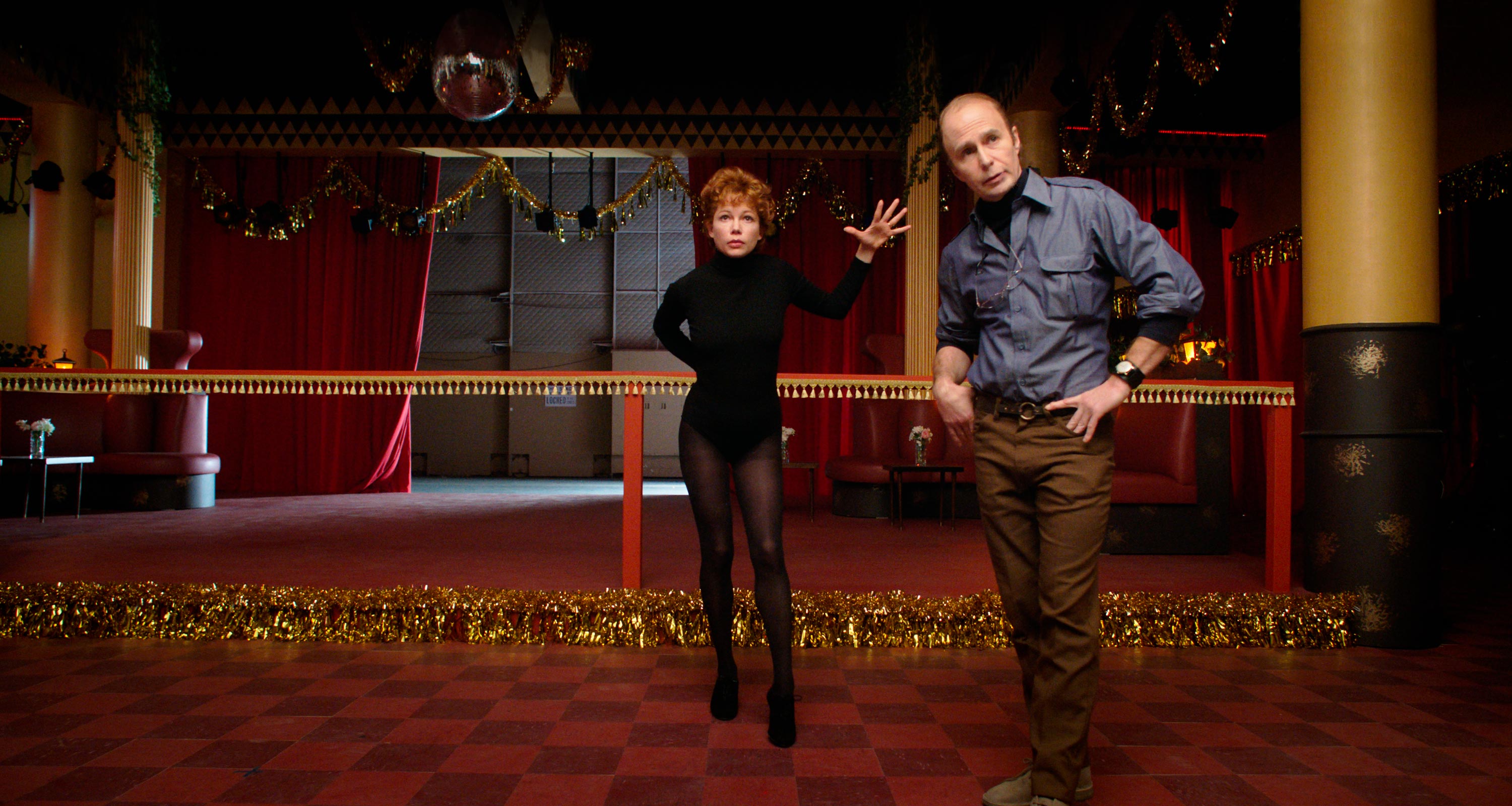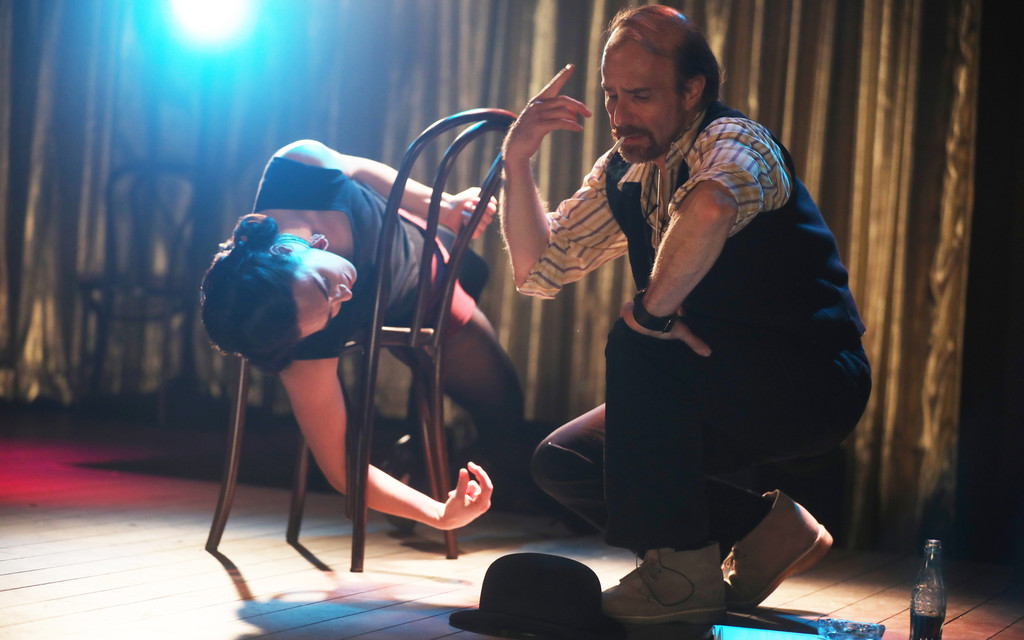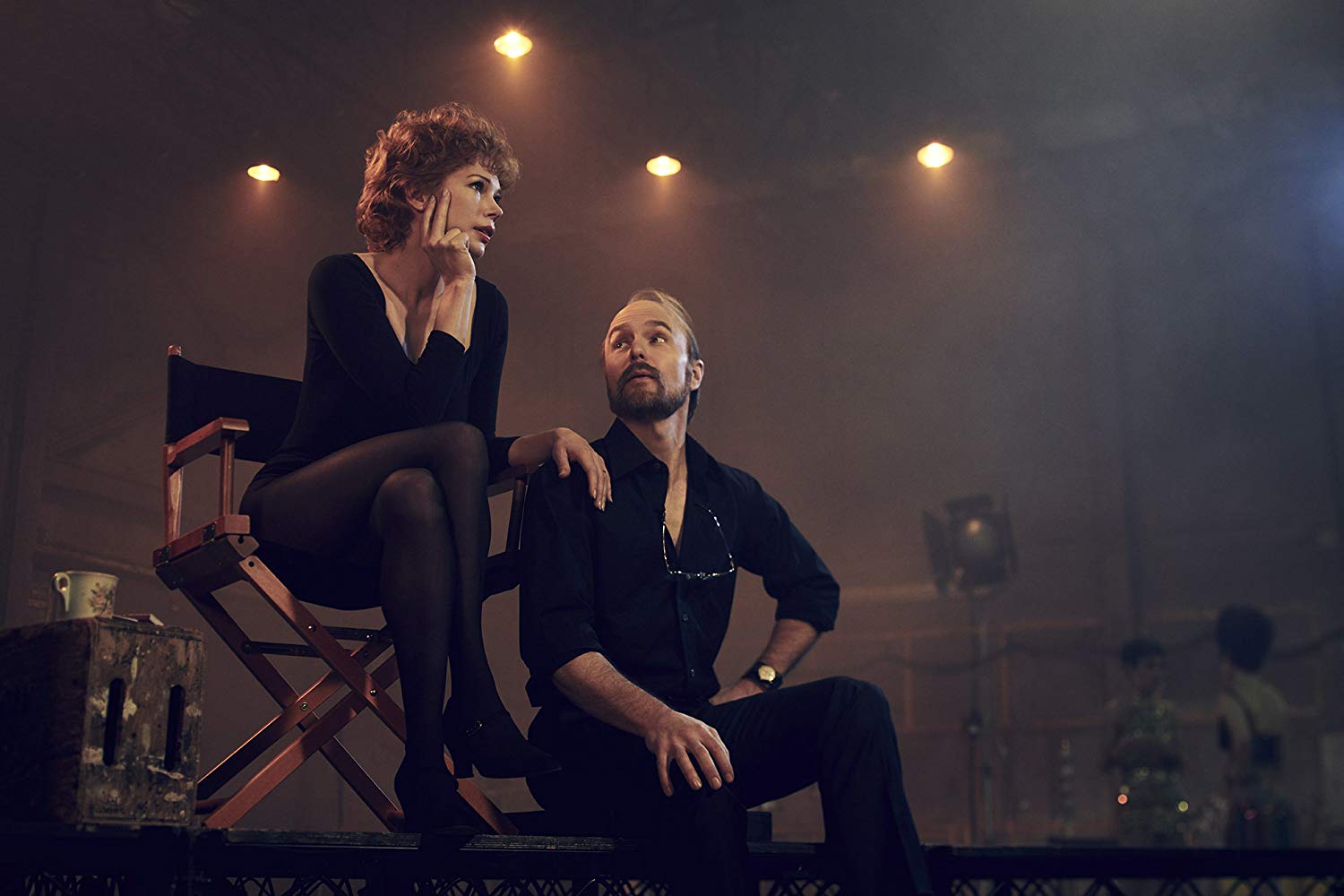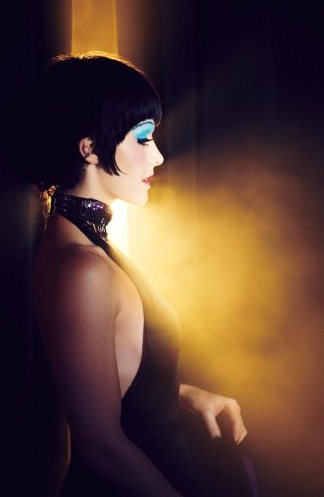by Chris Feil
FX’s Fosse/Verdon begins with two intriguingly quiet moments for a series founded in musical theatre. First, an older Bob Fosse waits alone in a hotel room, and someone comes knocking. Then we flash back to the genius working in tandem with his wife and partner Gwen Verdon, perfecting a piece of choreography in his iconic style. Gwen offers a slight adjustment to his angular positioning, and they proceed. “Yours is better,” he says decisively. This kind of personal and creative symbiosis, which has made the two depicted here into the stuff of Broadway hallowed history, is sadly only fleeting in the premiere of this new limited series.

There comes a creeping realization throughout that that glimpse of creative process between these theatre legends is one of the few in this episode that attempts to grasp Fosse’s unique vision. But what follows these opening moments quickly becomes beholden to typical biopic business, regardless of the immersion granted by respective players Sam Rockwell and Michelle Williams. Instead of the revolutionary talents they were, it’s as if this Fosse and this Verdon could be anybody based on how this story reduces them.
The premiere contains Fosse to his filmmaking career, beginning with the failure of his Sweet Charity adaptation. By now, the titular subjects are already established at the peak of their craft as the story enters their life, so forget the theatre for now. Hopefully the show will eventually flash back to their rise on the stage, and to the beginning of their relationship. At least we get the brass of “Big Spender” to distract us at first.
But instead, Fosse is immediately positioned as an underdog with a flop on his hands. Meanwhile Gwen looks on encouragingly despite having been usurped in the musical’s transition from stage to screen, replaced in the title role by Shirley MacLaine. There’s a slew of unceremoniously introduced (and not even all by name) famous faces - Chita Rivera, Paddy Chayefsky, Neil Simon, Hal Prince - each of them more like distracting easter eggs than cleverly incorporated context for Gwen and Bobby’s world. One of the series’ immediate problems is how it relies on a degree of theatre trivia acumen to grasp what we we’re watching - any viewer without that knowledge might actually be more bored.

Fosse’s quick turnaround is convincing famed producer Cy Feuer (played by Paul Reiser) to hire him for the coveted director slot of the screen adaptation for Cabaret. Though Fosse first assuages him with his tales of performing for wounded soldiers during the war, it quickly becomes contentious over delays and unorthodox approaches. Rather than caving to studio whims as he did with his past failure, this time he will be uncompromising.
And here is the prime misstep of Fosse/Verdon - it misses the mark on displaying what made the director/choreographer such a revolutionary artist. Instead of illuminating the screen musical rules he broke with Cabaret or his influence, we are served an archetypal meticulous director versus tightwad producer of a thousand other biopics. The emphasis here is not what he wants, but merely that he demands it - and we lose a sense of his artform-shifting vision without it.
Rockwell is given little to work with, as well. His Fosse is a passive witness to his own flashbacks rather than participant in them, one of the very many ways this stands in the shadow of All That Jazz. There is also the subject of Fosse’s well-documented philandering (shown here with his affair with Cabaret’s on-set translator) that feels more like a factoid than integral piece of understanding the man’s psyche. Thus far, the show doesn’t seem all that interested in allowing the actor to burrow into Fosse - he could be any anonymous director that once bickered with a producer.

Also frustrating, it also gets similarly reductive with his relationship with Verdon. Get ready for a host of suffering wife cliches - though Verdon’s career was partly deferential to Fosse’s, the series immediately aches for more of her brilliance as well. Williams however mines Verdon’s maneuverability beautifully, lending some texture to the dancer-actress’ willingness to shrug off her sublimation. The narrative thrust is that Verdon was Fosse’s foundation of support, but we wish for a show less rote that could better bolster what Williams is delivering.
 Another welcome distraction comes with Kelli Barrett’s giddy but not schlocky approach to playing Liza Minnelli. If the show can’t give us depth, it should at least make good on a rich history of iconography and we get the one-two punch of “Mein Herr” and “Cabaret” this episode.
Another welcome distraction comes with Kelli Barrett’s giddy but not schlocky approach to playing Liza Minnelli. If the show can’t give us depth, it should at least make good on a rich history of iconography and we get the one-two punch of “Mein Herr” and “Cabaret” this episode.
But while “Mein Herr” was the subject of Feuer and Fosse’s biggest dustup, “Cabaret” is used to contradict the fragile order that Verdon has restored on set. After playing negotiator between husband and producer, she once again sacrifices herself to overseas flights for Bobby to get the perfect gorilla costume for the “If You Could See Her” number. It’s a joyful tune cut with undercurrents of oncoming tragedy, here with Verdon unprepared to find the translator in Bobby’s bed on her return. As she arrives, we cut back to the aged Fosse in his hotel room, with that knock at the door being Verdon herself. Perhaps if the show will have anything unique to offer over its eight episodes, it will be in structural leaps that surprise and clever repurposing of the tunes that defined their careers.
As we wait to see just what event Fosse and Verdon are preparing to attend, the show will have much room to grow as it charts their relationship. Not just a disappointment thus far for musical theatre fanatics, it appears to be primed to reduce what was revolutionary about its subject down to bare bones basics. Is this just going to be another paint-by-numbers Greatest Hits biopic, but stretched over eight hours?